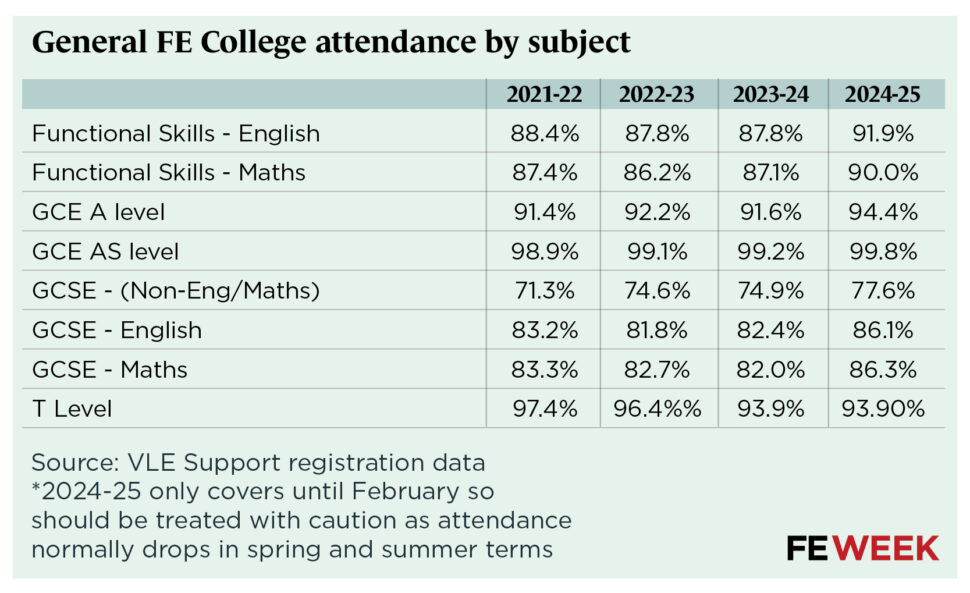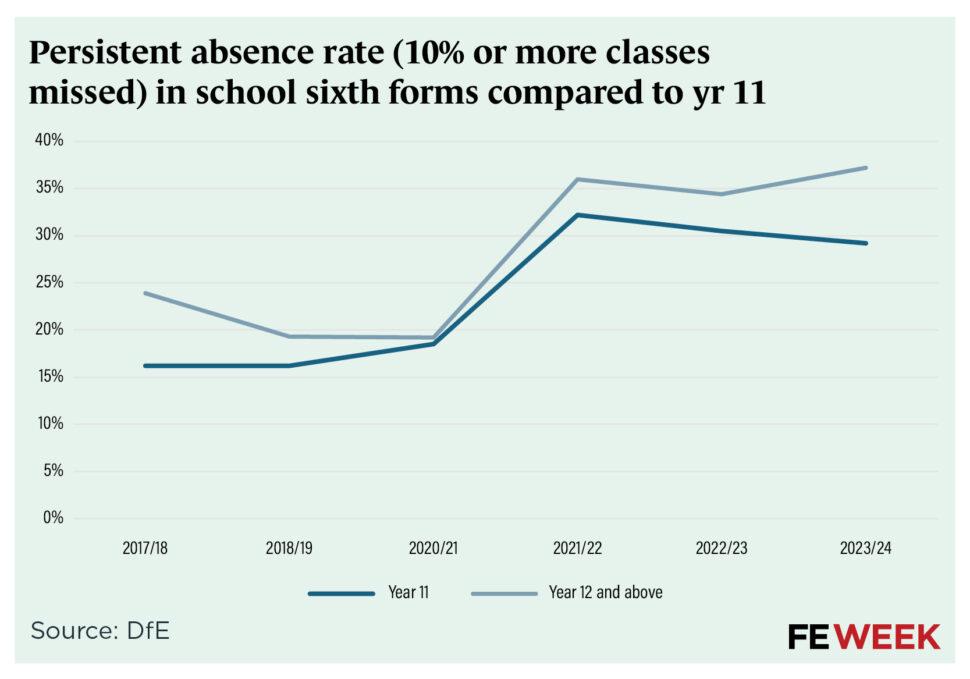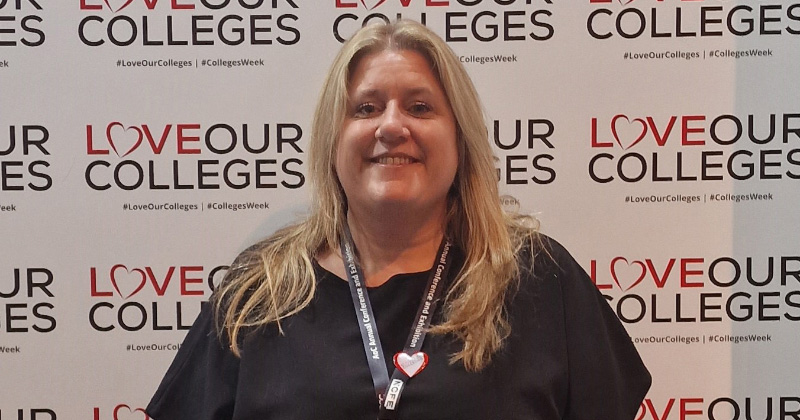While the Covid pandemic forced students out of classrooms, it seems that five years later colleges are still struggling to get them back in.
Ninety per cent is widely perceived as the minimum acceptable attendance level for learners to maintain.
But anonymised attendance data exclusively shared with FE Week shows that, instead of bouncing back after Covid, attendance at general FE colleges dropped from 90.3 per cent in 2020-21 (when classes were held remotely) to below 89 per cent for every academic year since.
According to a survey by the National Association for Managers of Student Services (NAMSS), attendance and punctuality were the most common types of challenging behaviour that got worse in colleges in the past year, cited by 52 per cent of 63 college respondents.
However, colleges are also fighting tooth and nail to reverse the trend – by ramping up involvement with parents, bolstering enrichment and pastoral support and even offering students vouchers for showing up.

Depressing data
Attendance fell in the three years to 2023-24 across age groups. But there was a particularly steep drop for adult learners who, because of the cost-of-living crisis, were often working more to make ends meet.
Data from FE software provider VLE Support covering 40,000 students shows that for 16 to 18 year olds, attendance fell from 91 per cent in 2020-21 to 89 per cent. For 19 to 23 year olds the drop was 92 to 90 per cent, and for those 24 and older the decline was 93 to 89 per cent.
Department for Education data shows attendance is even worse in school sixth forms. Last year attendance across years 12 and 13 hit 88.5 per cent, its lowest level since lockdowns, and 0.9 percentage points lower than for year 11.
In contrast, overall attendance in secondary schools rose by 0.1 percentage points last year to 91.1 per cent.
Sixth formers also had record levels of persistent absence. Over one-third (37 per cent) missed 10 per cent or more of lessons compared to 29 per cent of year 11s.
Meanwhile, A-level attendance for 16 to 18 year olds has also dropped in general FE colleges – by almost four percentage points since 2020-21 to 91.6 per cent last year.
Diane Booth, vice principal of West Nottinghamshire College, told a meeting last year that its 1.2 per cent drop in year 13 A-level attendance was “linked to some students preferring to study at home rather than in college, once the exams have commenced” although doing so was “not supported by the college”.

‘Disengaging’ from maths and English
It will come as no surprise to college leaders that English and maths GCSE retake classes have the worst attendance rates of all. A 2023 Association of Colleges survey found almost a quarter of learners were missing classes.
Ofsted reports frequently reference poor attendance in those subjects, with construction and hairdressing courses also commonly highlighted as problematic.

Tuition charity Get Further’s interim CEO Dr Alice Eardley says the problem springs from English and maths cohorts often having “complex support needs”, with many having “negative prior experiences of education”, and resit students needing better support to drive progress and reengagement.
But from September, colleges must deliver 100 hours of teaching for maths and English during the academic year as a condition of funding – which could worsen attendance figures further.
The government has just axed a requirement for adult apprentices to do functional skills. But adult attendance on maths and English functional skills courses in colleges has been better than for younger cohorts – at 89 per cent for each subject since Covid, compared to 87 for maths and 86 per cent for English for 16 to 18s.
T Level attendance has also waned, from 98 per cent when they were piloted in 2021-22 to 94 per cent last year.
Muddled measures
Building a clear picture of college attendance is tricky. Unlike schools, there is no national benchmarking system or agreed guidelines for authorised and non-authorised attendance.
Some colleges capture attendance at every lesson, others measure it once a day. And consistency within groups isn’t guaranteed either.
For example, in June Trafford & Stockport College Group reported English and maths attendance of just 62 per cent. But it said attendance for the hubs it launched for those subjects – which are “used ad hoc as an additional support measure” – was “good”.
Furthermore, suspended and excluded students are not included under absence data.

Why are learners not turning up?
NAMSS chair Lisa Humphries believes the biggest contributor to absenteeism is more students perceiving they are anxious, which becomes “a reason not to do things and facilitates them becoming more disconnected”.
She believes poor attendance is a “symptom of the issues young people are facing in society”, including being “over-stimulated with technology” and exposed to unchecked, extreme views.
In a 2023 Association of Colleges survey of 68 colleges, nearly 90 per cent cited poor mental health as the main reason for absenteeism, up from around 50 per cent in 2019.
That same year, an NHS report suggested 22 per cent of 20 to 25 year olds and 23 per cent of 17 to 19 year olds had a mental disorder, up from 10 per cent in 2017. The rate was twice as high for females.
The absence rate is higher for female sixth formers, research last year by ImpactEd found, but in FE colleges the gender split is fairly equal.
Colleges have witnessed a spike in mental health referrals since Covid. Salford City College reported a fivefold increase over the five years to 2023, and a “significant increase” in safeguarding incidents.
Heart of Yorkshire Education Group’s last published accounts reported a “significant legacy from Covid-19” in terms of behaviour and mental health, “consistent” with information from its partner feeder schools and other FE providers.

Relentless efforts
Last year, level 2 electrical student Carl (not his real name) was skipping more classes than he turned up for at Leeds College of Building – his attendance was 47 per cent.
His “chaotic homelife, police run-ins and ongoing mental health challenges resulted in behavioural issues and disruptive behaviour throughout his school life”, says the college’s vice principal of curriculum, quality and innovation Rob Holmes.
Fortunately, Leeds is one of many colleges to prioritise attendance, partly in response to a March 2024 Ofsted inspection that flagged attendance as “too low”.
A monitoring visit this year praised the college for being “relentless in tackling poor attendance” through a “less punitive approach” which was helping students on entry-level and level 1 courses make “substantial improvements”.
Following parental and staff meetings, target setting, extensive coaching, meetings with safeguarding and police contacts and interventions from cultural agencies, Carl’s attendance rose to 82 per cent. His behaviour and mental health have improved too.
Efforts to tackle absenteeism appear to be sector-wide. Most Ofsted observations about attendance between 2022 and the start of 2024 were negative. Since then, reports have frequently cited the huge efforts colleges are making.
For example, Oldham College was praised for designing a summer school for students who did not attend school or experienced school exclusion. This improved their attendance “considerably”. Management also recruited additional staff such as youth workers who “carry out home visits and provide individual support”.
Inspectors noted that Moulton College in Northampton arranges transport for persistently absent learners “rather than withdraw them and risk them not being in education, training or employment”.
At Cambridge Regional College, staff “understand the safeguarding risks in the local area” so leaders “monitor attendance of vulnerable groups robustly to ensure students and apprentices are safe if they are absent”.

Tackling mental health first
Many college attendance strategies have focused on helping learners feel less anxious.
When learners returned to Trafford and Stockport College Group after the pandemic, strategies included “time-out cards and the use of breathing techniques to reduce their anxiety”, Ofsted inspectors found, which helped learners “improve attendance and achieve well”.
Harlow College, recognising a “stigma with male mental health particularly in the construction trade”, embedded a level 1 mental health course into its construction course. The college also signposts learners to e-learning modules in mental health first aid and advocacy in the workplace.
At City of Sunderland College,students who struggle to attend due to physical mobility or mental health issues were receiving “high-quality resources to use remotely”.
And at Wigan & Leigh College, principal Anna Dawe says her pastoral specialists are “on the doors in the morning, on the corridors at lunch time and as lessons change over” to tackle attendance, and also liaise with parents.
Parental engagement has stepped up considerably since Covid.
At Sandwell College in West Bromwich,staff make announced and unannounced home visits to discuss attendance with learners and their parents.
At Leeds College of Building, Holmes says a “key part” of their strategy was creating a “shared responsibility for student success” with parents.
And at Macclesfield College, parents receive absence alerts by text, and 80 per cent engage with an online portal to review attendance.

Enrichment solutions
In recent years, budget cuts and staffing constraints have squeezed enrichment activities at many colleges. But some are bringing them back to boost attendance.
Harlow College went from having no enrichment programme to 40 per cent of its first-year students engaging in such activities last year.
Chichester College Group bolstered its enrichment offer to “foster a sense of belonging” and “motivate young people to spend more time on campus,” says its director of student experience Nick Mercado.
When a group came back from Wales they loved each other
The group’s director of pastoral support, Matt Wright, takes groups with low attendance on excursions such as “a day at the watersports centre as a minimum” or “a week in Wales as a maximum”.
“What you would find, without question, is that when a group came back from Wales they loved each other, and the teachers that went with them,” he says. “They wanted to come back to college and be in lessons.”
But some popular enrichment activities, such as gaming, can also cause barriers to attendance.
Steve Harrison, local college director for Castleford, part of the Heart of Yorkshire group, says his college experienced challenges with students gaming during class time.
“We had to keep constantly checking the timetable to see if they were meant to be in their lessons. We now have more control over that.”

Carrots, not sticks
NAMSS chair Humphries says colleges try to treat learners “as adults”, and “differently” to how they may have been treated in school through “positive behaviour management” rather than punishment.
Engagement specialist Kheron Gilpin believes that today’s technological and social context means capturing young people’s attention is “becoming more and more challenging”.
He recommends colleges “celebrate people for being present” and added: “Letting them feel a sense of achievement just by showing up proves quite effective.”
Some colleges are providing extra incentives as carrots, which are praised in Ofsted inspection reports.
At Bolton College, students with high and improving attendance are entered into a draw for vouchers. Its strategies have resulted in increased attendance for 16 to 18 vocational courses and GCSE English and maths.
On USP College’s level 3 engineering course, in Benfleet, Essex, teachers run a competition for the best attendance record.
Gold stars
Capel Manor Collegestaff in North London “promote good attendance” through trips, certificates of achievement and celebration parties.
East Surrey College’s positive incentives include bursary schemes, gold stars and sports club memberships.
And after RNN Group identified that students’ reasons for poor attendance included bus cancellations, financial struggles and anxiety, its managers liaised with bus companies, provided bursaries and assigned anxious learners with buddies to accompany them at college
It says the strategies are “beginning to have a positive impact”.
St Helens College’s attendance incentive strategies include not only a free breakfast but “monetary vouchers”. An attendance league table pitting courses in the construction department against each other created an “atmosphere of friendly competition,” Ofsted inspectors said.
“The quality team has now identified this as good practice, and there are imminent plans in place to implement this initiative across the college.”
















Is this the first public published manifestation of a campaign to reinstate an attendance allowance?